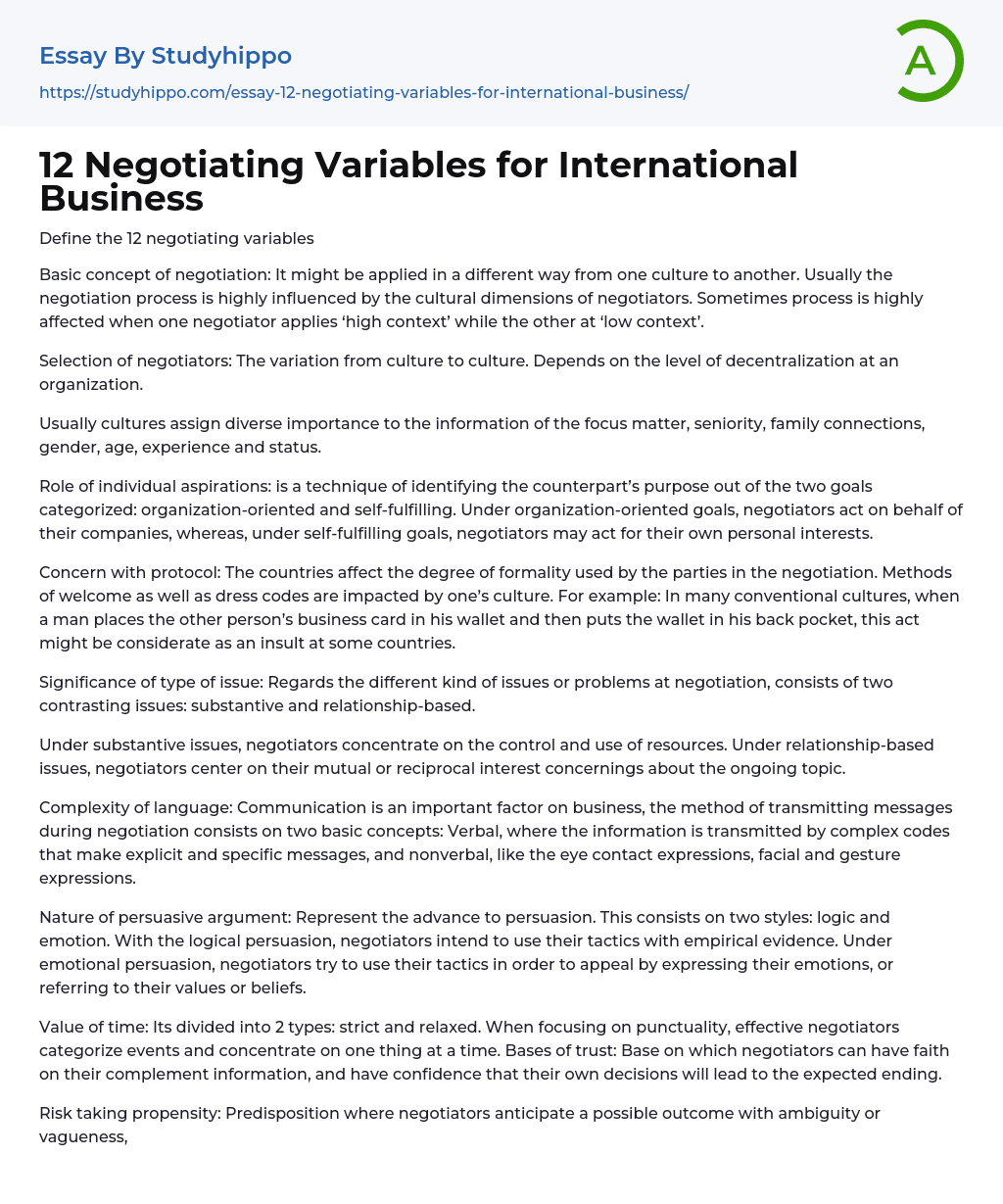

12 Negotiating Variables for International Business Essay Example
Define the 12 negotiating variables
Basic concept of negotiation: It might be applied in a different way from one culture to another. Usually the negotiation process is highly influenced by the cultural dimensions of negotiators. Sometimes process is highly affected when one negotiator applies ‘high context’ while the other at ‘low context’.
Selection of negotiators: The variation from culture to culture. Depends on the level of decentralization at an organization.
Usually cultures assign diverse importance to the information of the focus matter, seniority, family connections, gender, age, experience and status.
Role of individual aspirations: is a technique of identifying the counterpart’s purpose out of the two goals categorized: organization-oriented and self-fulfilling. Under organization-oriented goals, negotiators act on behalf of their companies, whereas, under self-fulfilling goals, negotiators may act for their own personal interests.
Concern with
...protocol: The countries affect the degree of formality used by the parties in the negotiation. Methods of welcome as well as dress codes are impacted by one’s culture. For example: In many conventional cultures, when a man places the other person’s business card in his wallet and then puts the wallet in his back pocket, this act might be considerate as an insult at some countries.
Significance of type of issue: Regards the different kind of issues or problems at negotiation, consists of two contrasting issues: substantive and relationship-based.
Under substantive issues, negotiators concentrate on the control and use of resources. Under relationship-based issues, negotiators center on their mutual or reciprocal interest concernings about the ongoing topic.
Complexity of language: Communication is an important factor on business, the method of transmitting messages during negotiation consists on two basic concepts: Verbal, where the information is transmitted by complex code
that make explicit and specific messages, and nonverbal, like the eye contact expressions, facial and gesture expressions.
Nature of persuasive argument: Represent the advance to persuasion. This consists on two styles: logic and emotion. With the logical persuasion, negotiators intend to use their tactics with empirical evidence. Under emotional persuasion, negotiators try to use their tactics in order to appeal by expressing their emotions, or referring to their values or beliefs.
Value of time: Its divided into 2 types: strict and relaxed. When focusing on punctuality, effective negotiators categorize events and concentrate on one thing at a time. Bases of trust: Base on which negotiators can have faith on their complement information, and have confidence that their own decisions will lead to the expected ending.
Risk taking propensity: Predisposition where negotiators anticipate a possible outcome with ambiguity or vagueness, it’s represented by two different types: cautious and adventurous.
Internal decision-making systems: procedure where the organizational decisions are made analyzing the company experience, structure, and internal communication.
It’s considered as: authoritative, the leader team makes decisions without others concern or consensus; and consensual, where the team leader consults his superiors. * Form of satisfactory agreement: Final variable inside the negotiations process where we can confirm the arrangement of negotiation between parties. Divided into two types: Explicit, like written contracts ; and Implicit, covering unpredicted future probable changes are made through negotiators personal associations. Web pages: •(2009) Explore Economies – France.
Retrieved on March 3rd, 2011; from the web site Doing Business: http://www. doingbusiness. org/data/exploreeconomies/france Text Book: •Lewicki, Roy J. ; Barry, Bruce and Saunders, David M? McGraw-Hill International Edition. Sixth edition, 2010.? ISBN: 978-007-126364-1 Bibliography Concepts: •(2009) Role of Culture in Cross-Border
Negotiations. Retrieved on March 3rd d, 2009; from the web site: http://62. 103. 39. 56:8080/ketakemak_images/TheroleofCultureinNegotiations_F14686. pdf •Kennedy, G.. 2011. Negotiation. Edinburgh Business School. Recuperado el 3 de Marzo del 2011 de
- American Dream essays
- Barriers To Entry essays
- Capitalism essays
- Central Bank essays
- Compensation essays
- Consumerism essays
- Economic Development essays
- Economic Growth essays
- Economic Inequality essays
- Economic System essays
- Economy essays
- Employment essays
- Export essays
- Finance essays
- Free Trade essays
- Gross Domestic Product essays
- Human Development essays
- Income Inequality essays
- Industry essays
- Inflation essays
- International Business essays
- International Trade essays
- Macroeconomics essays
- Materialism essays
- Max Weber essays
- Microeconomics essays
- Minimum Wage essays
- Monetary Policy essays
- Monopoly essays
- Pricing essays
- Profit essays
- Recession essays
- resources essays
- Taxation essays
- Trade essays
- Unemployment essays
- Warehouse essays
- World economy essays
- Activism essays
- Communism essays
- Conservatism essays
- Liberalism essays
- Marxism essays
- Nationalism essays
- Patriotism essays
- Policy essays
- Public Policy essays
- Social Contract essays
- Socialism essays
- Totalitarianism essays



